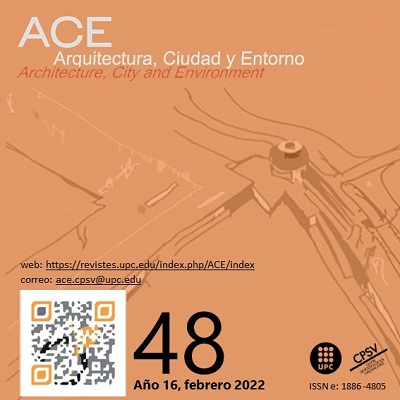Taxonomía de herramientas participativas en el contexto de la planificación urbana
DOI:
https://doi.org/10.5821/ace.16.48.10623Palabras clave:
Participación, de abajo hacia arriba, planificación comunitaria, proyecto urbanoResumen
Los últimos cincuenta años de transformación urbana han generado un impresionante "saber hacer" en los estudios urbanos en Europa. Sin embargo, hacer que nuestras ciudades sean cada vez más atractivas a través de ambiciosos planes urbanos de transformación y renovación, también ha generado problemas como la gentrificación, la degradación del patrimonio, tensiones sociales, turismo de masas e incluso exclusión en diversas formas. Heredados de la década de 1970, los procesos de participación, directamente relacionados con la recuperación de la ciudad, están resurgiendo ahora en los procesos urbanos y arquitectónicos de las ciudades democráticas. Una regeneración urbana sostenible y resiliente significa trabajar con las comunidades cuando las ciudades se transforman, dándoles la oportunidad de colaborar en la creación de la ciudad. Por lo tanto, se requiere una metodología participativa compleja y lista para usar para que urbanistas, arquitectos, arquitectas y paisajistas trabajen de manera interdisciplinaria con especialistas. Esta investigación propone la creación de una metodología para la acción participativa con herramientas nuevas y tradicionales (tecnologías de la información y las comunicaciones, mapeo, cartografías de Big Data, urbanismo táctico, encuestas de opinión entre otras), a través de su clasificación en una taxonomía. Este artículo muestra la taxonomía generada a través del análisis de varios estudios de caso históricos y recientes en los que las verdaderas actrices y los verdaderos actores del urbanismo, sus usuarias y usuarios, co-diseñaron el proyecto. Combinando las herramientas, deberíamos poder construir una metodología o una guía para los talleres de co-creación.
Descargas
Publicado
Número
Sección
Licencia
COPYRIGHT
El contenido de los artículos y los comentarios en ellos expresados son responsabilidad exclusiva de sus autores, y no reflejan necesariamente la opinión del comité editor de la revista. Los trabajos publicados por ACE pueden reproducirse bajo la licencia CC-BY-NC-ND 3.0 ES más información http://creativecommons.org/licenses/by-nc-nd/3.0/es/
Lo que implica que las personas autoras sólo retienen y mantienen los derechos de Copyright dentro de las limitaciones incluidas en la licencia anterior.


































